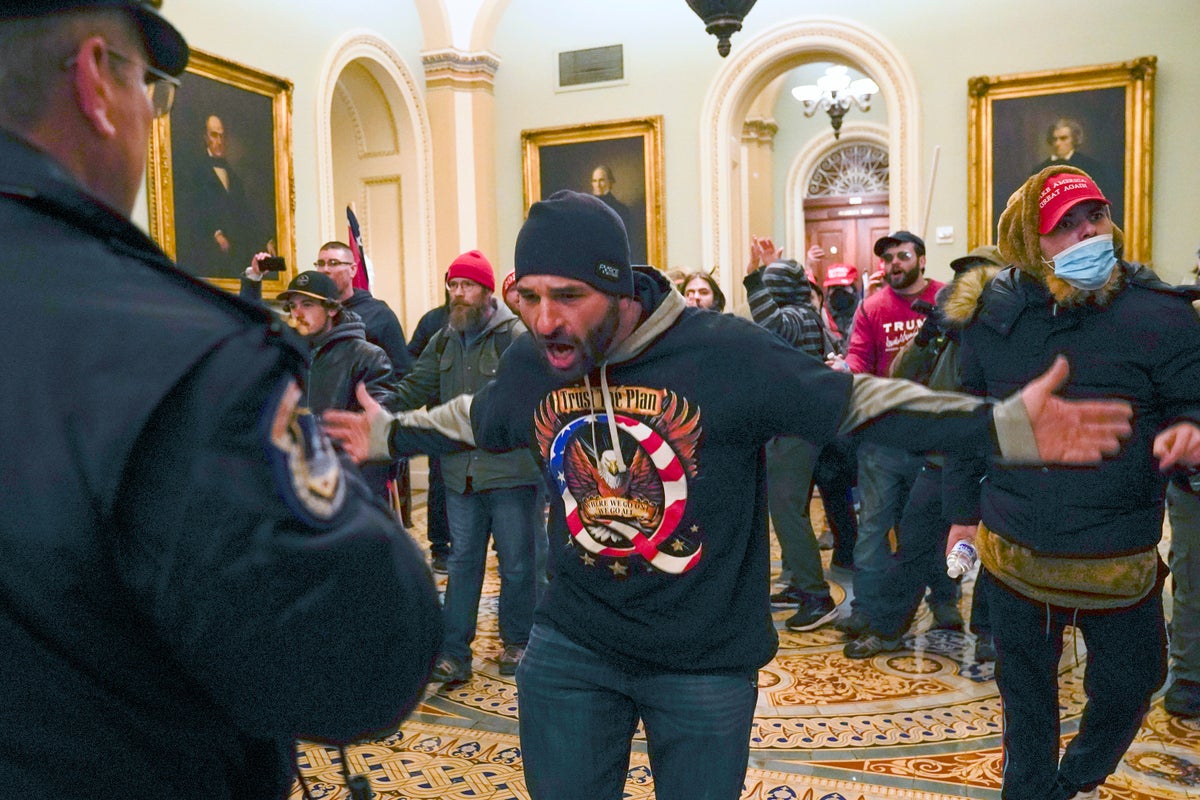
An Iowa man who was part of the mob that stormed the U.S. Capitol believed a conspiracy theory that law enforcement officers would be arresting “all the corrupt politicians” that day, starting with then-Vice President Mike Pence, a defense attorney told jurors Tuesday.
Doug Jensen wore a shirt bearing the letter “Q” to express his adherence to the QAnon conspiracy theory when he joined the Jan. 6, 2021, attack on the Capitol. A viral video recorded by a reporter's cellphone showed Jensen running after a Capitol Police officer who was retreating from a crowd of rioters up a flight of stairs.
A federal prosecutor showed jurors the video at the start of Jensen's trial. They also saw a photograph of Jensen with his arms extended as he confronted a line of police officers near the Senate chambers, one of the most memorable images from the riot.
“This is not a whodunit case,” defense attorney Christopher Davis said during the trial’s opening statements. “Literally, the whole case is on video.”
But he stressed that none of the video shows Jensen engaging in any violence or property damage.
“You will not see this man lay a hand on anyone,” Davis said.
Assistant U.S. Attorney Emily Allen told jurors they will hear testimony by Capitol Police Officer Eugene Goodman. Jensen was at the front of a group of rioters who followed Goodman as the officer ran up the stairs.
Goodman “approached them with his hand on his gun because he had no way of knowing what they were capable of doing,” Allen said. “And he knew that he was desperately outnumbered and alone.”
Davis said Jensen, a construction worker, was motivated by his “100%” belief in QAnon, a conspiracy theory that spread beyond the dark fringes of the internet to penetrate mainstream Republican politics.
QAnon has centered on the baseless notion that former President Donald Trump was secretly fighting a Satan-worshipping cabal of “deep state” enemies, prominent Democrats and Hollywood elites during his time in the White House. Another core tenet of QAnon is the apocalyptic prophesy that “The Storm” was coming and would usher in mass arrests and executions of Trump's foes.
Before the riot, Trump and his allies spread the false narrative that Pence somehow could have overturned the results of the 2020 election. Davis told jurors they will hear Jensen implore police officers to “do their job” and arrest Pence, who was presiding over the Senate on Jan. 6.
“He believed they were obligated to do it,” Davis said. “He believed that martial law was going to be instituted.”
After scaling the outer walls of the Capitol, Jensen climbed through a broken window to enter the building. He was one of the first 10 rioters to enter the building, according to prosecutors.
Allen said Jensen learned from a friend's text message that Pence was about to certify the election results.
“That's all about to change,” Jensen replied.
Jensen is charged with seven counts, including charges that he obstructed the joint session of Congress to certify President Joe Biden's 2020 electoral victory, that he interfered with police and that he engaged in disorderly conduct inside the Capitol while carrying a knife in his pocket.
Allen said Jensen “got what he came for” in Washington on Jan. 6.
“The proceedings in Congress stopped,” she said. “That's why he was there.”
Jenson drove back home to Des Moines, Iowa, a day after the riot. The following day, he walked six miles to a police station and showed up unannounced, saying he was probably a wanted man. But there weren't any warrants for his arrest when two FBI agents questioned him at the station.
Jensen told the agents he considered himself a “digital soldier” who was “religiously” following QAnon. He said he worked his way to the front of the crowd because he "wanted Q to get the attention.”
“I basically intended on being the poster boy, and it really worked out," he said, according to a transcript of the interview on Jan. 8, 2021.
Jensen told the FBI agents his belief in QAnon cost him friends and family members who think he is “insane.” One of the agents asked him if he had any regrets about his actions on Jan. 6.
“I don’t know. It depends on if the outcome I wanted happens, then it would have been worth it. But if nothing happens except for negativity from this, and I’m a rioter, then, yeah, I completely regret it,” he said.
Jensen asked U.S. District Judge Timothy Kelly to suppress statements he made to the FBI and the evidence seized from his cellphone. The judge denied his request earlier this month.
The first government witness for Jensen's trial is scheduled to testify Wednesday. Kelly said the trial could conclude later this week.
More than 870 people have been charged with federal crimes for their conduct on Jan. 6. Approximately 400 of them have pleaded guilty. Juries have convicted eight Capitol riot defendants after trials. None of the defendants who had jury trials was acquitted of any charges.







